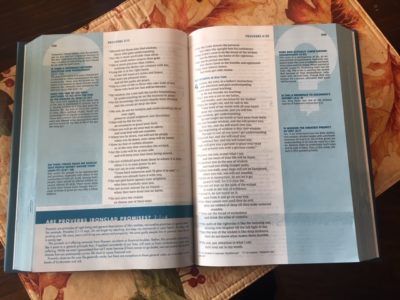Do you find that you have more questions than answers when you read the Bible? Do you wish there was someone there guiding you, instructing you, clarifying your questions as you read?
It could be you need a new approach, or some new tools in knowing how to study the Bible and find the answers you need.
As part of the Bible Gateway Blogger Grid, I was mailed a free copy of the new NIV Quest Study Bible in exchange for an honest review on my blog.
Now, I have several Study Bibles on my shelf (such as The Woman’s Study Bible, The Reformation Study Bible, The International Inductive Study Bible, The Life Application Study Bible) and each has a different focus. But, I was encouraged to see that this particular Study Bible is targeted toward the individual who comes to God’s Word with questions – especially questions that are particularly relevant today – and it provides a simple way to find the answers. In fact, this Study Bible directly addresses many of the questions that you, my readers, write and ask me.
Throughout the pages are sections with answers to the “Top 100 Most-Asked Questions” including:
- How do we know the Bible is true? (Hebrews 4:12)
- Is “One Man, One Woman” the only kind of union God approves of? (Genesis 2:24)
- What are angels, and how do they interact with the world today? (Genesis 28:12)
- Are people just pawns in God’s chess game? (Job 1:13-19)
- How can I tell if I have too much stuff? (Matthew 6:19-20)
- What about those who have never heard about Jesus? (Acts 4:12)
- How can we gain victory over secret sins? (Colossians 3:8-9)
- What is spiritual warfare, and how does it affect me? (Ephesians 6:12)
- How should Christians teach their children about God? (2 Timothy 1:5)
- Do Christians really need to attend church? (Hebrews 10:24-25)
In addition to answering the “Top 100 Most-Asked Questions,” this Bible also includes on the bottom of nearly every page answers to questions like: Are dreams messages from God? (Genesis 28:12-15), If God chooses us, do we really have a choice? (Ephesians 1:4-5), and Can someone who is saved fall away? (2 Peter 2:20-22). The study notes are responsible in how they answer, pointing out that differing views and conclusions exist on certain topics and directing you to further verses to come to your own conclusions based on the Word of God, not an individual’s input.
Along the side margins on every page are answers to questions that naturally arise as you read certain verses. Again, helpful cross references are often given, so you can look at the topic in context and study it further.
This study Bible also includes a thorough Index to Subjects, a Dictionary-Concordance, an Index to Color Maps and Perspectives from the Bible – a “What to read” guide“ when the future seems hopeless, when you are seeking God’s direction, when you need comfort, when others disagree with you, and so on.
I recommend this Bible for you if you find yourself going to God’s Word with questions. Or, if you are ministering to someone else who often has a question you have difficulty in answering. The cross-references will actually teach you to start studying the Bible, in context, for yourself.
What question about the Bible is burning on your heart? Let me know in the comment section below and I’ll do my best to let you know how this Study Bible addresses it.





I just want to know for sure that I am saved
I’m so glad you asked, Debbie. Acts 4:12 tells us “Salvation is found in on one else [but Jesus], for there is no other name under heaven given to mankind by which we must behaved.” But it doesn’t mean just believing in your head that Jesus is the Son of God. The Scriptures say even the devil believes and trembles. Salvation is found in trusting in Jesus Christ ALONE (not your good works, not a “Christian background” and not “church attendance”) and not just as a belief, but as a confession of faith and a lifestyle. Romans 10:9-10 tells us clearly “if you confess with your mouth that Jesus is Lord and believe in your heart that God raised him from the dead, you will be saved. For with the heart one believes and is justified, and with the mouth one confesses and is saved.” Thanks for asking such an important question. (And that answer was in my own words, based on actual Scripture, but you will find similar answers in the NIV Quest Study Bible).
Where was Jesus the three days before he rose?
Scripture tells us Jesus was in the tomb for three days before He arose. (If He were only there a few hours or even a day or two, some might have argued that He was never really dead.) Jesus said in Matthew 12:40: “just as Jonah was three days and three nights in the belly of the great fish, so will the Son of Man be three days and three nights in the heart of the earth.” According to the NIV Quest Study Bible “Some believe that between His death and resurrection, Jesus descended to Hades to preach to Old Testament sinners (Acts 2:27; Rev. 1:18). Others disagree, saying there can be no salvation after death (Hebrews 9:27). Still others believe Jesus preached to the fallen angels (spirits) in prison, announcing his victory and their impending judgment (Genesis 6:1-3; 2 Peter 2:4-5; Jude 6). I believe the latter interpretation, based on 1 Peter 3:19-20.
Is this Study Bible available to purchase? This sounds like just what I need to address questions that are asked if me…I have searched the Bible with the concordance given but some subjects are not addressed and it is very generalized and limited.
Yes, Carol. It is available anywhere you buy books or Bibles.
I love your teaching and explanations on the word of God.
Why is it important to get the Baptism of the Holy Spirit as a believer in Jesus?
Hi Marlene: I believe it is important to be “baptized” as a believer. The term “baptized” is only used in Scripture in terms of water baptism — which the church practices today as a public declaration of faith. Baptism, in and of itself, does not save a person, as we are not saved by works, but by grace and faith alone (Ephesians 2:9-9), but baptism is an outward display (or profession to others) of an inward repentance and work of God’s transforming Holy Spirit. Some churches refer to a “baptism of the Holy Spirit” as a second impartation of the spirit, but according to Scripture, a person is indwelt by the Spirit at the point of salvation (See Ephesians 1). To be “filled” or “controlled” by the Spirit means to be obedient to Christ and live with a yieldedness to the Spirit, daily. In other words, it means making sure that the Spirit of God is on the throne of your life, not yourself. Therefore, I believe it is a daily commitment to Christ that keeps us “filled/controlled” by the Spirit, not a second work or manifestation of the Spirit that comes upon us.